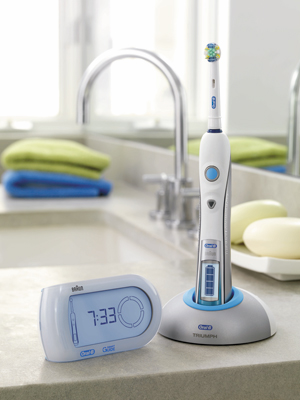Brushing Habits

NEW STUDY REVEALS THE TOOTH ON AUSSIES' ORAL CARE HABITS
-DENTAL EXPERT SAYS IT'S NO SMILING MATTER-
When it comes to oral hygiene, a new study suggests Aussies have some brushing up to do. The Oral-B Brushing Habits Study questioned 1,000 Australians about their dental habits and the tooth of the matter is Aussies have little to smile about!
According to the study, more than half of the nation (54%) could be risking cavities, gum disease and bad breath after admitting they don't always brush their teeth twice daily. Men take the cake, with a scary one in ten admitting to never brushing twice daily!
For those who do insist on more regular brushing, it's not always with ideal hygiene in mind, with one in four Aussies admitting to using someone else's toothbrush when in need. Women are the worst offenders of reaching for another person's brush when caught short in the bathroom! This oral care faux pas is no accident, with two thirds of those saying 'they just didn't have their own available at the time".
Leading dentist and Oral-B advisor Dr. Christopher Ho warns that sharing isn't always caring when it comes to our toothbrushes.
'While we can all relate to a time that we've been caught without a toothbrush, think twice before you reach for someone else's. There are many hundreds of bacteria and viruses in our mouths and sharing a toothbrush is likely to be passing these on – even if it belongs to a partner".
Perhaps our brushing off of proper brushing is the reason behind more than half (57%) of Aussies claiming they know someone who suffers from bad breath. While we're most likely to tell a family member or partner (two thirds), or a friend (29%) about their less than fresh breath, only 12 percent of Aussies would feel comfortable confronting a work colleague about the issue. This may explain why half the nation has gone as far as purposefully standing a distance away from someone with questionable breath.
Providing a breath of fresh air to the findings, the Oral-B Brushing Habits Study reveals that despite our misuse of the toothbrush, we seem to have good intentions when purchasing one, with nearly half of Australians (45%) ranking 'bristle type" as the number one influencing factor when buying a toothbrush – more so than colour and price.
'It's great to hear that Aussies are purchasing brushes based on their bristle type over more aesthetic options such as colour as it implies that we are taking care in our initial oral care choices," Dr. Christopher Ho says.
'However, the Oral-B study also shows that we've lost our way when it comes to brushing. It's one of the simplest things we can do to protect our teeth and gums, so there's really no excuse for not picking up the toothbrush twice a day," he added.
To help the nation brush up on its oral health, Dr. Christopher Ho shares his top tips:
1) Brush for a full two minutes, twice a day
Brush gently for a full two minutes twice a day using a pea-sized amount of fluoride toothpaste. Try timing yourself – many people think they're brushing for two minutes when in fact it's much less. The Oral-B Triumph with SmartGuide has a brush head and handle that are embedded with microchips that communicate with a wireless display unit (aka the -SmartGuide'). This helps guide you to each quadrant of the mouth and signal when you are brushing too hard. The SmartGuide encourages you to brush thoroughly, gently and for the dentist-recommended two minutes.
As dentists, we see a major difference in patients utilising this kind of innovative technology. Using a power toothbrush with a rotating-oscillating action will greatly assist in removing plaque and food debris, so something to think about if you're currently a manual brush user.
2) Floss every day
The old adage that you only floss the teeth you want to keep holds true. Dental plaque can cause cavities if it's left between teeth. When mixed with sugar, the bacteria that live in plaque can start the process of tooth decay; this is why it's bad to leave plaque in your mouth. If tooth decay spreads to the inner part of your tooth, root canal therapy may be needed to repair the tooth
We recommend flossing daily in addition to brushing as it can help the removal of plaque and bacteria between the teeth that can cause bad breath.
3) Drink more water, limit the intake of acidic drinks
Limit acidic drinks like soft drinks, sports drinks and fruit juices. These are not only high in sugar but contain acids that soften tooth material and dissolve the minerals in tooth enamel, causing holes or erosion. Drinking more water reduces the acid that causes tooth decay and helps keep the mouth clean.
MORE





